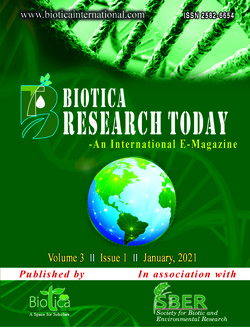
Foam Mat Drying of Fruits: Concept, Opportunities and Limitations
Thippeswamy B.
Division of Food Science & PHT, ICAR- Indian Agricultural Research Institute, Pusa, New Delhi, Delhi (110 012), India
Alka Joshi*
Division of Food Science & PHT, ICAR- Indian Agricultural Research Institute, Pusa, New Delhi, Delhi (110 012), India
Shruti Sethi
Division of Food Science & PHT, ICAR- Indian Agricultural Research Institute, Pusa, New Delhi, Delhi (110 012), India
DOI: NIL
Keywords: Application, Drying, Foam, Foaming agent
Abstract
Science of drying has evolved from traditional sun drying to ultra modern drying techniques such as freeze drying/ microwave drying/ infrared drying etc. Each drying method has its own opportunities and practical limitations. Foam mat drying has recently been explored as a method of processing and preservation of fruit powders. It is majorly used for viscous or high sugar matrices such as drying of bael, melon, beetroot, cherry, pineapple etc. which otherwise are difficult to dehydrate using other conventional drying procedures. Foam mat drying technology can be well adopted commercially due to its ease and ability to produce porous reconstituable dried fruit products. Therefore, foam mat drying can be considered as ‘second generation drying technique’ which provides benefits of both the drying methods; traditional and modern.
Downloads
not found
Reference
de Carvalho, T.I.M., Nogueira, T.Y.K., Mauro, M.A., Gómez-Alonso, S., Gomes, E., Da-Silva, R., Lago-Vanzela, E.S., 2017. Dehydration of jambolan [Syzygium cumini (L.)] juice during foam mat drying: Quantitative and qualitative changes of the phenolic compounds. Food Research International 102, 32-42.
Kadam, D.M., Wilson, R.A., Kaur, V., Chadha, S., Kaushik, P., Kaur, S., Rai, D.R., 2012. Physicochemical and microbial quality evaluation of foam-mat-dried pineapple powder. International Journal of Food Science and Technology 47(8), 1654-1659.
Valenzuela, C., Aguilera, J.M., 2013. Aerated apple leathers: effect of microstructure on drying and mechanical properties. Drying Technology 31(16), 1951-1959.
